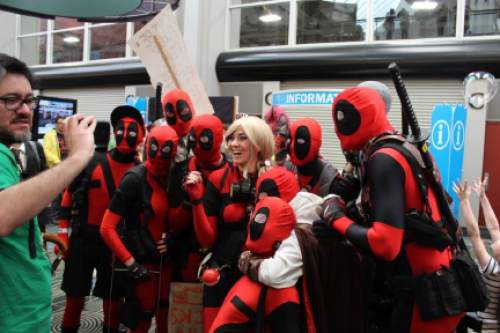This is an archived article that was published on sltrib.com in 2016, and information in the article may be outdated. It is provided only for personal research purposes and may not be reprinted.
Deadpool was made for the Internet age years before the advent of broadband and Web search engines.
When Fabian Nicieza co-created the Marvel Comics mercenary with Rob Liefeld in 1991, Deadpool embodied the id with no filter. And in his antics and his expressive personality, the anti-hero would prove to have a nearly unparalleled level of versatility.
As Nicieza read the letters pouring into Marvel after Deadpool debuted, Nicieza saw readers responding passionately and immediately. He knew the character had potential.
"Part of it [was] the amount of female readership; that tells you that a character is stretching out beyond the average parameters of the testosterone-laden comic shop, right?" Nicieza said Friday, at Salt Lake Comic Con's FanX convention in Salt Lake City. In the early days of the Internet, Deadpool spread across message boards, with seemingly more people talking about the "merc with a mouth" than his monthly issues had readers. Something about Deadpool was clicking beyond his native comic book.
Then the character transcended his origins and began his ascent into wider pop culture: "YouTube happened," Nicieza said.
Fans started dressing up as Deadpool: "Much like on the Internet ... you don't have to be a cool kid in normal life," said Aaron Sagers, former host of Travel Channel's "Paranormal Paparazzi" and founder of ParanormalPopCulture.com. "You put on that Deadpool mask, you can be anybody. You can be that jokey guy."
Fans dressed as the character posted videos of their antics at comic conventions. Before long, the videos took off, with their view counts suggesting a much bigger audience than the comic's monthly sales did. It didn't matter whether the antics were "100 percent accurate to the character," Nicieza said, because "it was certainly 100 percent accurate to their sense of fun and experience at the show."
Deadpool simultaneously represented anonymity, with his easily replicated full-face mask, and pure self-expression, as unfiltered as it was flexible.
"Especially in the social media age ... people feel that they should be allowed, no matter what, to express their voice," Nicieza said. "Here's a character who does that, regardless of the consequences." He added, though, that people should exercise filters for good reason.
Such an intersection of anonymity and self-expression would come to exemplify people's lives on the Internet. So when the Web found Deadpool, a niche anti-hero caught fire.
Now, the Ryan Reynolds-led "Deadpool" movie has earned more than $733 million across the world since it opened last month, according to the tracking website Box Office Mojo. Nicieza always knew Deadpool would do well, but he didn't expect him to do about seven times the combined budgets for filming and marketing.
And to think it all began with putting a new spin on superheroes.
When Nicieza and Liefeld created the character, "he was Spider-Man, but he was a villain. He was Punisher, but he's funny."
Utah comedian Jay Whittaker recalled walking into a comic shop near Los Angeles as a boy, when the store was buzzing about this new sensation. Whittaker picked up the comic and "just [remembered] reading it and laughing and enjoying it." As he got older and ventured into stand-up comedy, learning to laugh "at such serious situations," he said, "I completely fell in love with [Deadpool]."
Nicieza planned on a dark turn for the flexible character. But it wasn't meant to be, at least not by his pen.
After Liefeld left Marvel to start a new comics company and Nicieza was on his own, he planned to pull off Deadpool's mask and reveal his origin story. Deadpool would track down the people responsible for turning him into a mutant, while flashbacks would reveal that he had originally sought out those people to cure him of cancer.
"The entire proposal got rejected completely," Nicieza said. "They said it was too depressing and too horrific. And my response was, of course it's too depressing and too horrific. This is the next step. This makes you feel for this guy."
But Nicieza was stymied. Aside from that resistance, Marvel Comics editorial preferred to prolong mysteries and put off big reveals, he said.
Another writer, Joe Kelly, eventually got to tell that origin instead, after Nicieza had left the company.
If the origin story sounds familiar, that could be because the movie sticks pretty closely to it. In the end, it really was the character's next step — while he was making leaps and bounds in the age of the Internet.
Looking ahead, as the character enjoys the greatest popularity of his 25-year history, Nicieza hopes that the people in charge of the movie's sequel remember the chief reason the first one resonated so well: In an insane world, it structured a simple story around Deadpool's relationship with his girlfriend.
"The story is boy meets girl, boy loses girl, boy gets girl back again," Nicieza said. "And it worked flawlessly, and it makes you leave the theater feeling good. And when you leave a theater feeling good ... you tell other people about it, which exponentially expands your audience."
And if Deadpool has proved the ability to do anything in 25 years, it's that he can expand his audience.
Twitter: @MikeyPanda



